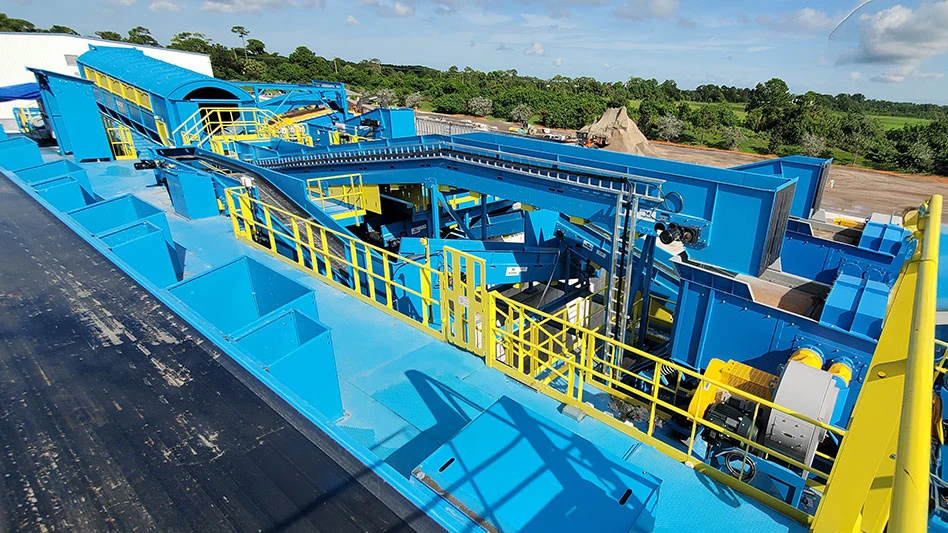Shred trucks that do not require commercial drivers’ licenses (non-CDLs) can add flexibility and growth potential to an information destruction operation—if correctly incorporated into a business model. Suppliers and destruction professionals say demand for non-CDL shred trucks has been on the rise for the last few years. While the trucks are smaller in length, gross weight and capacity compared with vehicles that require the operator to have a commercial driver’s license, not all companies or shred trucks are the same. If destruction companies weigh their options carefully before making a purchase, a non-CDL shred truck can be the right fit.
VARIED INTERESTS
Joe Roberto, vice president of sales and marketing for Cambridge, Ontario-based Shred-Tech, says, “Interest and demand are quite good for our non-CDL models and have been that way for two or three years now.”
Although interest in these smaller trucks is steady, information destruction companies are considering non-CDLs for different reasons.
Mike Campbell, mobile division sales manager for Vecoplan LLC, High Point, N.C., also has seen some customer interest shift to non-CDL trucks recently, and shred truck manufacurers have responded by delivering new models. “With the baby-boom era of non-CDL trucks, if you will, that we are in right now, we are going to see more non-CDLs as we progress down the road,” he says.
The reasons destruction firms are looking into this option are as varied as the types of non-CDL models on the market today. Suppliers say they are often approached by startups but also have been approached by established companies that are interested in adding diversity to their truck fleets. Newer businesses are drawn to the overall reduced cost, sources say. Gas mileage is usually better, and non-CDL drivers do not have to be paid as much as a CDL operator typically does, both of which can save companies money.
Mike Oden, sales and marketing director for Alpine Shredders, Kitchener, Ontario, says, “Startup operations look to mitigate startup costs, for certain. But the reality is that even traditional big-truck guys are adding them because payloads, while slightly less, have improved. Just five or six years ago, the state-of-the-art CDL truck held 9,000 pounds. You can now get that in a non-CDL truck.”
RECOGNIZING THE OPTIONS
With interest gaining momentum in the past several years, makers of non-CDL shred trucks have been able to devote time to developing improvements for the models they produce. However, some sources say these technological improvements are not the only factors destruction firms consider when they are shopping for shred trucks. The lower fuel costs and better maneuverability associated with non-CDL shred trucks also create interest in these models.
“If you can reduce the fuel of just two trucks in fleet, the savings are huge. I see that a lot with startups; it’s a cost savings of about $20,000 or $30,000,” Campbell says.
In rural areas, where a driver spends much of his or her workday driving from appointment to appointment, a reduction in fuel consumption makes a non-CDL shred truck appealing.
Oden adds that most non-CDL trucks can avoid costly interstate fuel taxes that are typically levied on businesses operating larger trucks. This can save a lot of money for companies with drivers who cross several state lines in one day.
Companies also should remember that because these smaller models generally hold less payload than a CDL shred truck, a driver may have to unload more often. Ultimately, if this is the case, the driver will get less work done, which might override the fuel savings.
Doug Ferrante, sales manager for UltraShred LLC, Spokane, Wash., says, that when it comes to non-CDL trucks, “Shredder speed is usually 50 percent of a CDL truck. Payload is about 50 percent of a CDL truck. Having less available payload can add to the labor costs by making the operator dump more often during the day.” He adds, “The crucial mistake made by many startups is buying a non-CDL truck because it is cheaper to get into. This can be a company killer.”
Rural routes are not the only areas where these trucks are being used. Companies also have found non-CDL shred trucks to be useful in metropolitan areas where customers are located closer together. The benefits of lower fuel costs can apply in these areas, and there is an additional advantage of improved maneuverability.
Campbell says maneuvering in metro areas like Washington, D.C.; Atlanta; or New York can be difficult with CDL trucks. “You have these little alleyways and you have to get permits; but, with non-CDLs you can get around better,” he says.
Many cities require permits to park CDL trucks in certain areas but usually don’t require them for non-CDL trucks, according to Campbell. “Not having to get permits saves time. Hospital loading docks are tight, those bank parking lots are tight, and you need maneuverability. Believe me, you don’t want to be hitting low hanging trees, breaking off your side mirrors or hitting cars.”
These reasons alone do not necessarily mean it is a good idea to purchase a smaller truck. Brian Drew, sales manager for ShredFast, Airway Heights, Wash., warns, “The maneuverability of a smaller truck can be really beneficial in congested areas. But, if the chassis is not spec’d correctly, it will not hold up as well, and whatever gains found in logistics are outweighed by operating cost.”
Don’t be seduced by the initial lower price, Drew adds. “If the company is a startup, I do not think it is wise to restrict growth potential. I believe the company should take an analytical approach to understand the complete cost, not just the initial price. Likewise, what the company perceived as freedom from regulation may become restriction of growth.”
ALL THE RIGHT PEOPLE
Another factor to consider is the effectiveness of using drivers who don’t have commercial driver training.
Vecoplan’s Campbell says, “You pay a commercially licensed person because he or she is a professional driver.” Young or non-professional drivers can be more prone to accidents than CDL drivers because they are less familiar with the equipment, he adds.
A revolving roster of drivers can slow business. Established companies may find that this defeats the potential savings of operating a smaller truck. For a startup, finding a new driver may mean less time available for selling, which could mean the company won’t be around next year.
Shred-Tech’s Roberto says, “Some hire [non-CDL] drivers at a lower hourly rate. After doing that for a period of years, people report back they hire CDL drivers. Non-CDL [drivers] are in transition and [may] find they don’t want to be a truck driver and, therefore, don’t commit and might not take good care of the equipment like drivers with CDLs do.”
Other people in the industry, like Alpine Shredder’s Oden, say they aren’t convinced non-CDL drivers are a liability. Less-experienced drivers can sometimes learn sales techniques more easily than a career CDL driver, a very important skill when establishing a client base.
He adds, “Wether we train someone who is new or someone who has driven for 30 years, we can go over everything they need to know, and it typically doesn’t take that long.”
According to those with a more favorable view of hiring non-CDL drivers, such as Oden, a CDL professional may have spent his or her career focused on driving, and, therefore, require as much sales or customer service training as a non-CDL driver.
BALANCED DECISIONS
Companies should consider their needs and establish immediate and long-term goals for their operations prior to buying shred trucks.
“Look at marketplace competitors and what kind of radius you’ll be traveling,” Campbell suggests. “If you’re looking to cover 200 to 300 miles, you should go with non-CDL. You’ll have to come back less frequently with more bang for your buck.”
He adds, “Who are you going after and where are they located—mom and pops, big hospitals, existing companies? Look at the business plan.”
By taking a realistic approach when shopping for a shred truck, an information destruction company can prevent growth restrictions, Drew says.
The author is assistant editor of Storage & Destruction Business and can be contacted at kstoklosa@gie.net.
Latest from Recycling Today
- Greenwave raises revenue but loses money in Q2 2025
- Recycled steel prices hold steady
- EY says India’s need for scrap imports will continue
- Coming full circle
- Amcor, DCM introduce fertilizer packaging with 35 percent recycled content
- Comstock Metals gets closer to commissioning commercial-scale solar panel recycling facility
- Washington selects Circular Action Alliance as PRO
- Smurfit Westrock expands in Latin America





